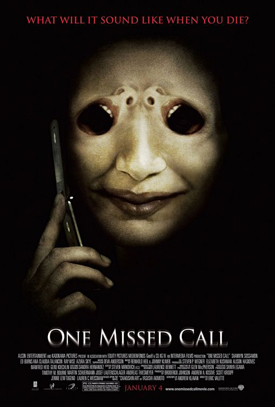 I know I’ve seen the original film version of One Missed Call, directed in 2003 by Takashi Miike. But I don’t remember much of it and won’t even try to dig up my DVD copy to compare it to the American remake, directed with corporate video elan by French helmer Eric Valette. Both feature cell phones, a music box ringtone no one has ever purchased, voice mails breathing the recipients’ imminent death in their own voice and a seemingly ceaseless cycle of abuse, extending to the audience.
I know I’ve seen the original film version of One Missed Call, directed in 2003 by Takashi Miike. But I don’t remember much of it and won’t even try to dig up my DVD copy to compare it to the American remake, directed with corporate video elan by French helmer Eric Valette. Both feature cell phones, a music box ringtone no one has ever purchased, voice mails breathing the recipients’ imminent death in their own voice and a seemingly ceaseless cycle of abuse, extending to the audience.
Not that any similarities matter. I still remember what Taka Ichese, producer of the original Japanese Ring and Grudge movies, told me years ago. That J-horror (I’m paraphrasing) was self-consciously inexplicable as bait for audiences. Japanese would assume the films didn’t make logical sense because of something they missed, not something the film lacked, and so would go back to see them again, making lots of money for the producers. He told me this smirking.
Here, however, we’ve got a movie that’s too bored with itself to muster even a measure of that cynicism. This isn’t one of Raimi and Tapert’s Ghosthouse affairs; in fact it’s something less. This is a movie that actively refutes the cinematic power of light, choosing instead a bland ready for DVD pastiness. It’s a film of spare visual and scripted language that over-simplifies and limits the thematic depth to that of amateur sketch comedy.
So we’ve got witless, obvious victims; Shannyn Sossamon as Survivor Girl, acting with the authority of a child practicing her dance recital steps; and here are the handful of frightening bits: strange faces, bugs, people aflame. The movie opens with a hospital fire to explain away the burning people, but justifications for the other two elements are delivered with an embarrassed shrug.
And this movie should feel humiliated. It wants to create a serious alter-ego of Final Destination, where death is just as capricious but not as shamelessly entertaining. It wants us to feel at ease with the supernatural, the better to gain credulity for the plot’s absurd game of deadly phone tag. But it also procedurally explains every unlikely ghostbusting step as performed by Sossamon and plastic cop Ed Burns.
Like an uncomfortable but harmless dream, the details are already difficult to recall. I remember becoming actively miffed when the film’s first visions were delivered during a lecture explaning how hallucinations occur to those suffering post-traumatic stress syndrome. Since the focal character in that scene is obviously meant to be misconstrued as the young survivor of the opening fire, I can’t decide if the movie is actively deceptive or more stupid than I’d imagined.
I would have been further annoyed by the final act’s dive into a stereotypically decrepit hospital and the false ending that ensues, but I realized rancor would get me nowhere.
Eric Valette, in part probably suffering Limited Budget Syndrome, has no affinity for place or atmosphere. Many exteriors were shot in Atlanta but they’re all designed to be Anytown, USA and the result is a cheap, forgettable aesthetic. Nothing convinces. Not Sossamyn’s big student mansion, her peephole flashbacks that look like Be Kind, Rewind‘s version of TheDiving Bell And The Butterfly and certainly not the intended chemistry between Shannyn and Ed, which wouldn’t even set off a baking soda volcano.
A few notable appearances: Margaret Cho looks positively defeated as a third-fiddle cop, but her downcast spirit is appropriate. Ray Wise channels charm and smarm as a reality TV producer. And I almost liked the uncredited Laura Harring, who appears in a few flashbacks. Though, like most of the cast, she’s just given a prop to project character (for her, cigarettes, meaning evil) and lets that do the work.
Finally, I got more entertainment out of predicting when the audience would laugh next, and looking for silly inconsistencies with respects to who has a death phone and who hasn’t. What should I expect, really? It’s January, when the DVD player might be best kept warm instead of the projector. At least go to the movies to catch up on the lingering joy of 2007, not for this cellphone spam.